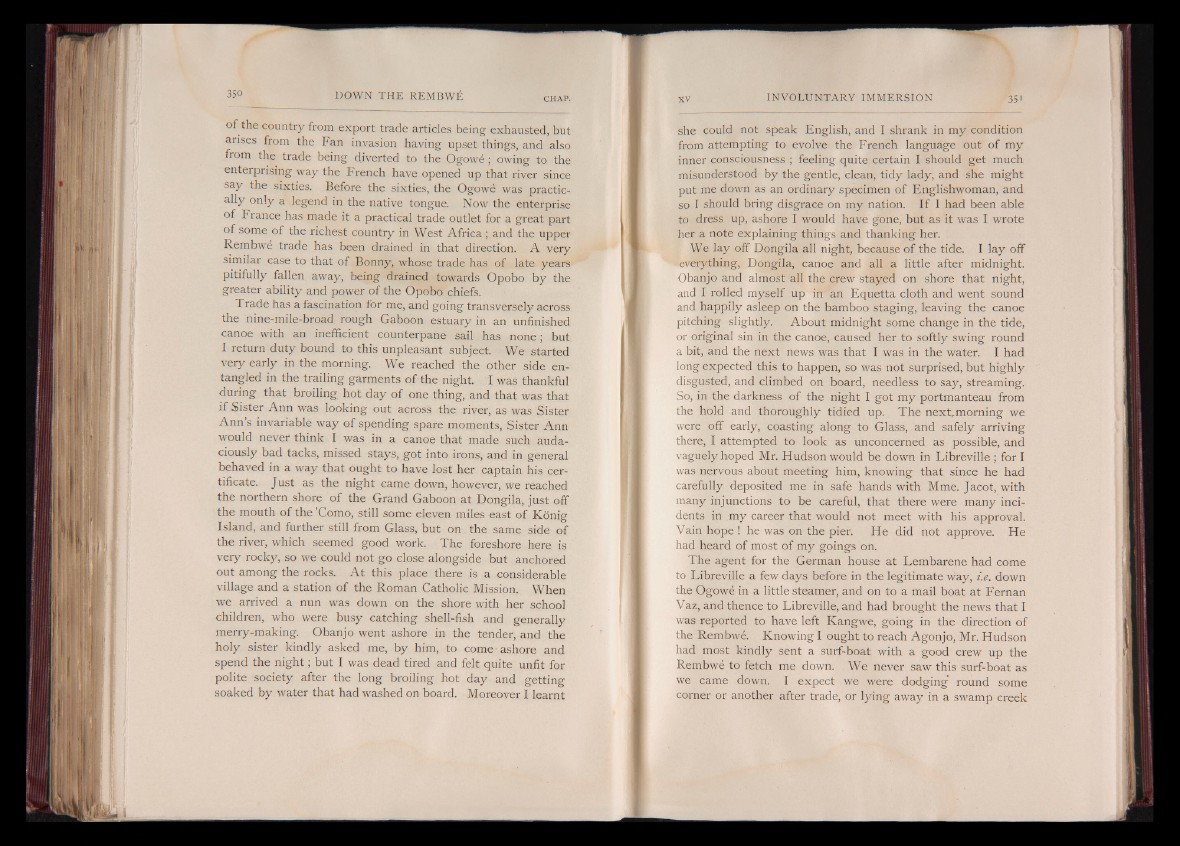
of the country from export trade articles being exhausted, but
arises from the Fan invasion having upset things, and also
from the trade being diverted to the Ogowe; owing to the
enterprising way the French have opened up that river since
say the sixties. Before the sixties, the Ogowe was practically
only a legend in the native tongue. Now the enterprise
of France has made it a practical trade outlet for a great part
o f some of the richest country in West Africa; and the upper
Rembwe trade has been drained in that direction. A very
similar case to that of Bonny, whose trade has of late years
pitifully fallen away, being drained towards Opobo by the
greater ability and power of the Opobo chiefs.
Trade has a fascination for me, and going transversely across
the nine-mile-broad rough Gaboon estuary in an unfinished
canoe with an inefficient counterpane sail has none; but
I return duty bound to this unpleasant subject. We started
very early in the morning. We reached the other side entangled
in the trailing garments of-the night. I was thankful
during that broiling hot day of one thing, and that was that
if Sister Ann was looking out across the river, as was Sister
Ann s invariable way of spending spare moments, Sister Ann
would never think I was in a canoe that made such audaciously
bad tacks, missed stays, got into irons, and in general
behaved in a way that ought to have lost her captain his certificate.
Just as the night came down, however, we reached
the northern shore of the Grand Gaboon at Dongila, just off
the mouth of the ’Como, still some eleven miles east of Konig
Island, and further still from Glass, but on the same side of
the river, which seemed good work. The foreshore here is
very rocky, so we could not go close alongside but anchored
out among the rocks. A t this place there is a considerable
village and a station of the Roman Catholic Mission. When
we arrived a nun was down on the shore with her school
children, who were busy catching shell-fish and generally
merry-making. Obanjo went ashore in the tender, and the
holy sister kindly asked me, by him, to come ashore and
spend the night; but I was dead tired and felt quite unfit for
polite society after the long broiling hot day and getting
soaked by water that had washed on board. Moreover I learnt
she could not speak English, and I shrank in my condition
from attempting to evolve the French language out of my
inner consciousness ; feeling quite certain I should get much
misunderstood by the gentle, clean, tidy lady, and she might
put me down as an ordinary specimen of Englishwoman, and
so I should bring disgrace on my nation. I f I had been able
to dress up, ashore I would have gone, but as it was I wrote
her a note explaining things and thanking her.
We lay off Dongila all night, because of the tide. I lay off
everything, Dongila, canoe and all a little after midnight.
Obanjo and almost all the crew stayed on shore that night,
and I rolled myself up in an Equetta cloth and went sound
and happily asleep on the bamboo staging, leaving the canoe
pitching slightly. About midnight some change in the tide,
or original sin in the canoe, caused her to softly swing round
a bit, and the next news was that I was in the water. I had
long expected this to happen, so was not surprised, but highly
disgusted, and climbed on board, needless to say, streaming.
So, in the darkness of the night I got my portmanteau from
the hold and thoroughly tidied up. The next, morning we
were off early, coasting along to Glass, and safely arriving
there, I attempted to look as unconcerned as possible, and
vaguely hoped Mr. Hudson would be down in Libreville ; for I
was nervous about meeting him, knowing that since he had
carefully deposited me in safe hands with Mme. Jacot, with
many injunctions to be careful, that there were many incidents
in my career that would not meet with his approval.
Vain hope ! he was on the pier. He did not approve. He
had heard of most of my goings on.
The agent for the German house at Lembarene had come
to Libreville a few days before in the legitimate way, i.e. down
the Ogowe in a little steamer, and on to a mail boat at Fernan
Vaz, and thence to Libreville, and had brought the news that I
was reported to have left Kangwe, going in the direction of
the Rembwe. Knowing I ought to reach Agonjo, Mr. Hudson
had most kindly sent a surf-boat with a good crew up the
Rembwe to fetch me down. We never saw this surf-boat as
we came down. I expect we were dodging round some
corner or another after trade, or lying away in a swamp creek